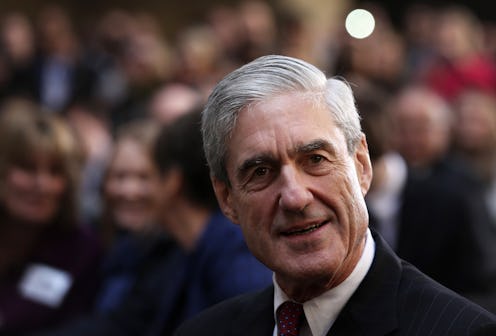
After nearly two years of investigation, Robert Mueller's report on Russian meddling in the 2016 election was submitted to Attorney General William Barr on Friday. But while the special investigation into potential Russian meddling in the 2016 presidential election is now complete, the public knows practically nothing about its contents for now.
One thing the public does know, however, is the report may well address more than just the actions of the Russian government. In his 2017 letter appointing Mueller to lead the investigation, Deputy Attorney General Rod Rosenstein gave Mueller the authority to investigate not only "the Russian governments efforts to interfere with the 2016 presidential election," but also "any matters that arose or may arise directly from the investigation." This included, as Rosenstein wrote, "any links and/or coordination between the Russian government and individuals associated with the campaign of President Donald Trump." Trump regularly denies that there was any collusion between his team and the Russian government.
Whether Barr will submit a version of the report to Congress is not immediately clear. Although the attorney general has received a copy of the report, as is required under Special Counsel regulations, it will be up to him to decide what information should be divulged to Congress, or the public. The proverbial ball is now largely in Barr's court.
But although the executive branch holds many of the cards, the legislative and judicial branches will potentially have a role in the Mueller report's release as well.
As Quartz reports, the Justice Department will be required to brief the House and Senate Intelligence Committees if Mueller's report concludes that Trump has been compromised by a foreign power. It would then be up to the heads of those committees to decide how much of the Justice Department's briefing to publicly reveal. Although it's anybody's guess what they'd do in such a situation, House Intelligence Committee Chairman Adam Schiff is a regular and strident critic of the president, and has accused House Republicans of collaborating with Trump improperly at various points in the investigation.
Perhaps more significantly, Schiff has already said that his committee will subpoena Mueller's final report, and "will take it to court if necessary." This brings up the possibility — and to be clear, this has not happened yet and there aren't any indications that it will — that either the Justice Department or the White House will move to prevent the report from being subpoenaed. This, as Quartz noted, would likely result in a Supreme Court fight.
Mueller was appointed head of the special counsel investigation in May of 2017 by Rosenstein, who assumed authority over the investigation after then-Attorney General Jeff Sessions recused himself from the probe. In the time since, speculation about the report's findings has been a regular topic of both American and international political discourse. Of special interest to both Democrats and Republicans, in particular, has been whether or not Mueller's investigation would reveal either intentional or unwitting connections between the 2016 Trump campaign and Russian officials attempting to influence the election.
Since the investigation first launched, Trump has vehemently maintained that there was "no collusion" between his presidential campaign and the Russian government. But as reports were periodically filed, and as more and more of those closest to the president both personally and professionally were implicated in potentially problematic interactions with Russian oligarchs and agents, questions about the president's connections with Russia grew.
These concerns were compounded by a seemingly never-ending torrent of media investigations dissecting the president's relationship with Vladimir Putin, as well as one notable Washington Post report which indicated that the FBI had opened its own, separate investigation into the matter after Trump fired former FBI Director James Comey. Still, Trump maintained that there were absolutely no inappropriate ties between his presidential campaign and the Russian government.